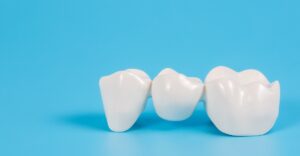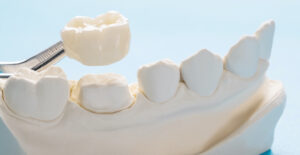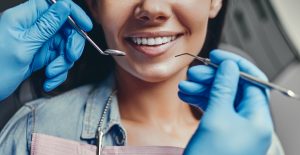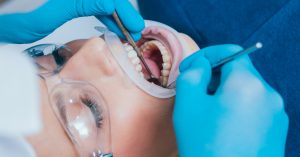Canker sores are ulcers in the mouth, appearing as a painful white or yellow sore surrounded by a reddish inflamed border. Canker sores may be caused by multiple factors such as stress, food allergies or a weakened immune system. A canker sore usually forms in the soft unattached tissues of the mouth and is typically not contagious.
What are Canker Sores?
The medical term for canker sores is Apthous Stomatitis. Apthous ulcers appear in either a solitary
fashion or as a cluster of small ulcers. They vary in size from 1-10mm. Canker sores can occur at any age, and more commonly in women. They occur inside the mouth, appearing on the movable (unattached)tissues of the mouth i.e. the tongue, soft palate, cheeks and inside lining of the lips or the bottom of the gums (vestibule). It usually starts with a burning sensation, followed by a red area that ulcerates. These ulcers are extremely painful and can take 1-2 weeks to heal. The sores are rarely associated with any other diseases and fever is rare.
Canker sores and cold sores
Canker sores should be differentiated from Herpes (commonly known as fever blisters or cold sores).
Herpes labialis commonly occurs outside the mouth on and around the lips and facial area, as a crusted ulcer. When Herpes occurs within the mouth, it will only occur on the non-movable(attached)tissues which are the gums adjacent to teeth(gingiva) and the hard palate. Herpes ulcers are usually smaller than canker sores and form blisters before ulcerating.
Causes of canker sores
Approximately 20% of the population suffers from canker sores. Canker sores do not appear to be caused by viruses or bacteria. The cause is unknown, but several possible causative factors have been suggested. It is theorized that there may be a immune system malfunction, which triggers the body to attack its own cells in error.
There are also numerous local factors which are thought to increase ones’ susceptibility to mouth ulcers. Mouth trauma such as following a dental procedure, cheek, tongue or lip biting or brushing too vigorously can cause canker sores. Anything that lowers the immune system such as stress, a viral infection, allergies or hormonal changes during the menstrual cycle may trigger canker sores. Most often, however, they occur for no apparent reason.
Canker sore treatment
As healing is spontaneous, treatment is chiefly symptomatic, that is, it is aimed at making the patient comfortable. Accordingly, focus is on relieving the discomfort and speeding up the healing process.
The use of mild topical steroids can be used to decrease the inflammation and facilitate healing. Mouth rinses containing the antibiotic tetracycline have been shown to speed the healing by reducing the incidence of bacterial infection and unpleasant discomfort associated with canker sores. However, it is essential to avoid tetracycline if you are pregnant. Also, it must not be administered to children as it is well documented that tetracycline can permanently stain the teeth during a child’s development. Oral steroids may be necessary in recurrent severe cases of canker sores. Your physician or dentist will decide if the need for this exists. Over-the-counter topical medications, some of which contain benzocaine and other soothing agents help reduce the discomfort of canker sores by numbing the affected area temporarily.
As canker sores are considered open wounds they are prone to bacterial infection and irritation which would delay healing. It is therefore important to maintain good oral hygiene and avoid hot or spicy foods which might further irritate the area. Mild mouth washes such as warm salt water may aid
in hygiene and reduce discomfort. Reducing your daily stress and maintaining a balanced diet and healthy lifestyle also helps in preventing the occurrence of canker sores.
You must consult your dentist if you are not sure if you have true canker sores, if your mouth sores are accompanied by fever, weakness and swollen lymph nodes or if your ulcers do not heal for two weeks. The dentist can arrive at a definitive diagnosis by doing a biopsy of the ulcerated area.












